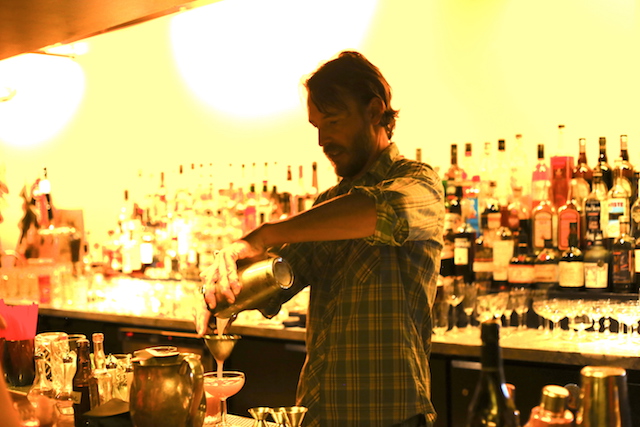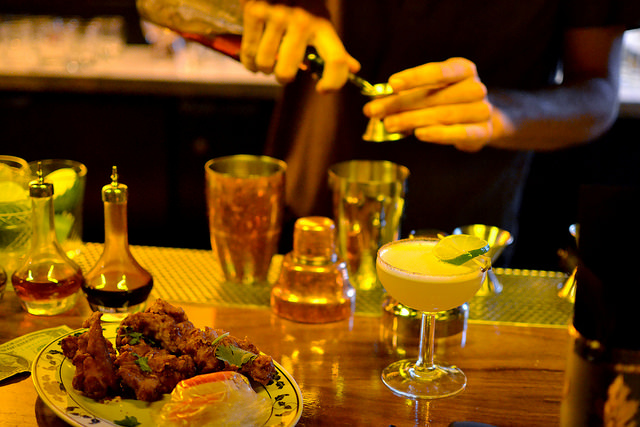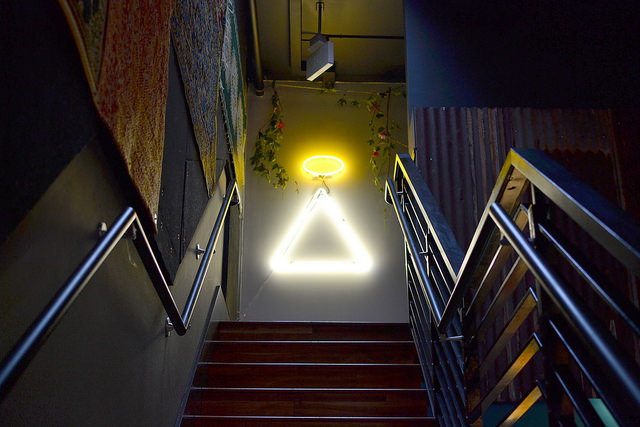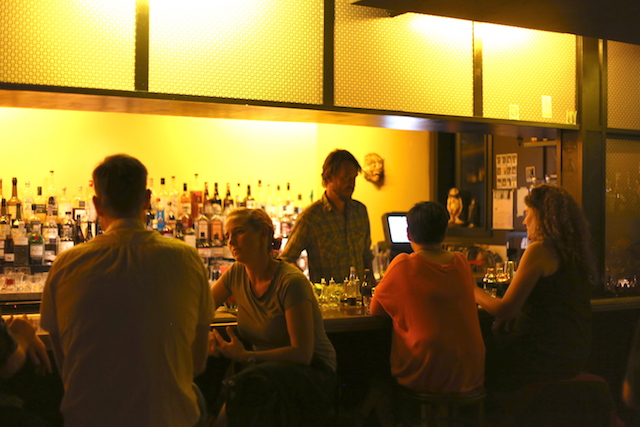Bartender Spotlight: Troy Bayless of Holy Mountain

I sat down and had coffee with Troy Bayless, the co-owner and bar manager of Holy Mountain, a bar tucked upstairs from Hawker Fare restaurant in San Francisco's Mission District. Troy's an interesting guy and I had a lot fun talking to him about what he's been up to and what Holy Mountain is all about.

I've always known you as the guy who sets up bar programs. It seems to be your modus operandi.
Yeah, well it was either that or try to be a photographer for the rest of my life. [Being a photographer] was fun, but the work was intermittent and you can't depend on it. I mean, you can. But it's more of a hustle than bartending. I think it's even more stressful than owning a bar sometimes. For me, it was too much.
You recently went to Spain? Tell us about that.
Everyone there is completely invested in what they're doing. They believe in the idea that this is their life. It's such a different take on how [Americans] go about business, and how few people choose to do what they really want to do.

I feel like you and the Holy Mountain crew are doing that in your space.
Yeah, it's a slow roll.
You do what you want to do. You guys are passionate. You're not cranking out drinks like a machine. You're just doing your thing.
Believe me, I think about it often. People come in all the time and say, "Does this place ever get busy?" I'm like, "How busy do you want it to be?" Because if it's busy, and when it is, you're not going to be able to get a drink for 20 minutes. Would you rather stand in line like everyone else and queue up, or do you want to be able to talk to the bartender about that whisky you are looking at? It's always a funny conversation because...

Because they have this tone about it, don't they?
Yeah, always. Where we're at – located in the Mission, 18th and Valencia – it's often younger people who want to party, they want to be seen. This is a bar for adults. Everyone is welcome, of course. But, our intention isn't to just be a club. Ideally, it was intended to be more like a lounge, where you can sit down in a booth and hang out with friends. It's not about what's happening around you, it's about the conversations that you're having rather than the scene you're in. But for me, there's always conflict with that too. Of course, you want to be busy.
It's that fine line of being passionate about something versus making ends meet.
Sure. On some level, like a cultural ethical tether of, is this what we set out to do? Are we going to hold on to this idealism? Or are we going to just let it fly? At most places, and I worked at a lot of them, the clientele dictates what goes on, because the business model has changed accordingly. And that's OK because they're like, "Well, we're making this much money." That's fine. But then sometimes there aren't any barriers at all, and then at that point it becomes a shit-show. You show up and no one is in control. It's kind of scary.

So what do you do to control your clientele?
People weed themselves out. We don't serve certain things. Like I said, everyone is always welcome, but we don't cater to people who are just looking to get rowdy and messed up. We've made certain choices, like we don't have Slippery Nipples or five different types of flavored vodkas. Actually, we one – we have St. George's Green Chile Vodka.
The other side of that story is that people are always looking for something different right now. Technology is running what's happening here [in San Francisco] and there are a lot of creatives in that field. Holy Mountain and most of these places that are on Valencia Street, or that are popping up all over the City, would not exist. Money would not be here. The ability for bartenders to be creative, for businesses to be creative, or even to have a bar that's sequestered above a Thai restaurant, would be very difficult without that community here. It's a double-edged sword. There are issues that I don't like about it. But that just means as a business owner, or a person who is making something, you have to scale back how far you can go into the creative realm.

I feel like Holy Mountain is like an industry bar. It's like your favorite bartender's favorite bar.
Yeah, it's funny that you say that. I think the next move is to start opening on Sundays and Mondays so that industry folks can show up. We are closed on the days that most industry folks have off. I think it's about time to do that. It's nice to know among your peers that you're respected and that people want to show up to your place because they feel comfortable there. That's the achievement. People in our industry, we all talk about "this place, this place, and then what's the place that you like to go to where you feel most comfortable." Regardless if it's [Holy Mountain] or not, I feel for me it's old places. I took my fiancée to Scoma's with my son. That place has been there since 1965. An Italian immigrant opened that place in Fisherman's Wharf. It still stands up! The Manhattan is delicious. The Cioppino is delicious. And it feels like you're in San Francisco, still, even though it's in Fisherman's Wharf. It's not a place just for aging hipsters, or people who have been exposed to the Internet at a young age, who have access to everything. It's moms who have beehives in their 60s, families, and also young people there.

They've probably been going to Scoma's for years.
Exactly. For me, that's the ideal. That's the place that I want. And I don't necessarily think that's Holy Mountain, but that's the place I want to build. A place that has a real legacy.
I mean, it could be Holy Mountain. It just takes time. That's the only way to build. At the same time though, you're not going to be on Valencia Street forever. I think people will follow you wherever you go. People know who makes good drinks.
That has become the culture. I really appreciate the old places. I think it's because the guys who I learned from really took stock in that, and they still do. They believe in the classicism of cocktail culture, where the bartender has been at a bar forever and regardless if it's named after that person or not, it's respected because this person set it up and it continues on that path. That's a major achievement. It's just hard. I think everything in [San Francisco] right now is in transition and will continue to be for a while. SF has always been a place that's continually moving around and continually remaking itself. Whatever change is happening, you have to roll with it. California as well. California has always been that way. People are always coming from somewhere else. They want something better. It's beautiful here. There's a mystique. At the same time, it's fleeting. There are very few places that actually make it, like Scoma's, because of changing wants and needs.

What are some other favorite old spots that still resonate with you?
In Oakland for me, there's The Fat Lady. Then there's Baggy's By The Lake. I used to go there like 10 years ago. You'd get locals, misfits, an older gay crowd. They'd have chili cook-offs. You can hang out and talk to people. It's like their living room, which is great. They can be themselves. Also, Heinold's First and Last Chance Saloon, which has become something completely different on some level, but you still get merchant marines coming in there, six at a time, getting off the boat, wanting to drink some whisky and beer.
Over here [in San Francisco], North Beach is one of the first places I ever went to.
It's nostalgic for you.
Yeah, it is. In my early 20s, I'd go there and hang out, and just make the rounds. Specs', which is across from Ferlinghetti's bookstore, and was a boho spot for a long time. That place still resounds with history and literature. Poets hang out there. When I was in journalism school, I would go up to Specs'. I met this guy who was a CBS filmmaker/cinematographer during the Vietnam War. He and I would talk, because he noticed my camera, which I would bring everywhere. He introduced me to his friends and we'd get drunk. These guys were all like 60 years old. Some of them had gone to Panama, or been involved in the drug trade, all kinds of weird insider stories. For me, as a 20 year old, it was intriguing and dark. You go in [to Specs'] and you can still meet interesting people. People still talk to each other. People who don't know you will strike up conversation with you on any given night. And for me, that's what it's all about it.
If you live in a city for a long enough, you've had an experience at one of these places, right? As bar owners, this is what we should be building upon. We want people to come and have a great and memorable experience. This guy named David who just moved out of San Francisco left us his grandmother's Balinese wood carving as a token of his appreciation and his enjoyment of [Holy Mountain]. David was like, "I know you guys are going to look after this. I want it to be here when I return." And for us, that's the crowning achievement. Honestly, more important than making money. Someone found our place to be comfortable enough to want to come back, tell all their friends that they shared something with us that everyone could appreciate. A place that has some life in it.

Do you have those Balinese wood figurines on display at Holy Mountain?
We just got it recently. My intention is to put it up. The other thing is that people steal so much shit if it's not bolted down. I've had this conversation with Dylan O'Brien from Prizefighter. He was like, "Yeah man, especially in the bathrooms." Even if it's screwed into the wall, people will try to steal it. We have tiki mugs downstairs at Hawker Fare and we come across nice ones and I want to have them available for people. But then if people keep stealing them. They're not thinking; they just presume you have mountains of gold to pay for all this stuff. It's expensive. And after awhile it's disheartening. You lose motivation and hope. What are these people going to do when they take it home? It's going to live in their cupboard. It's going to die there. Why would you do that? I don't understand.
This is why we can't have nice things. This is why I can't ride a nice bike. I have to ride a beater bike because I don't want my shit stolen.
That's the way to go. That part's sad. If people are [reading this]...
... stop stealing our shit.
Yeah. Leave it. If you like it so much, we'll put it aside for you and you can come back and have it anytime. Your name will be associated with that tiki mug. Just don't take it home. It's unfortunate.

I'm about to wrap this up. Any last words?
I appreciate the interview. What me and [Holy Mountain co-owner] Christ [Aivaliotis] do... it's bar-centric. We want to make it an experience where people want to come back and bring their friends. We like weirdos. Meeting new people who understand what we are trying to do. And not everybody gets it, and that's OK too. And you don't have to, as long as you have a good time.
